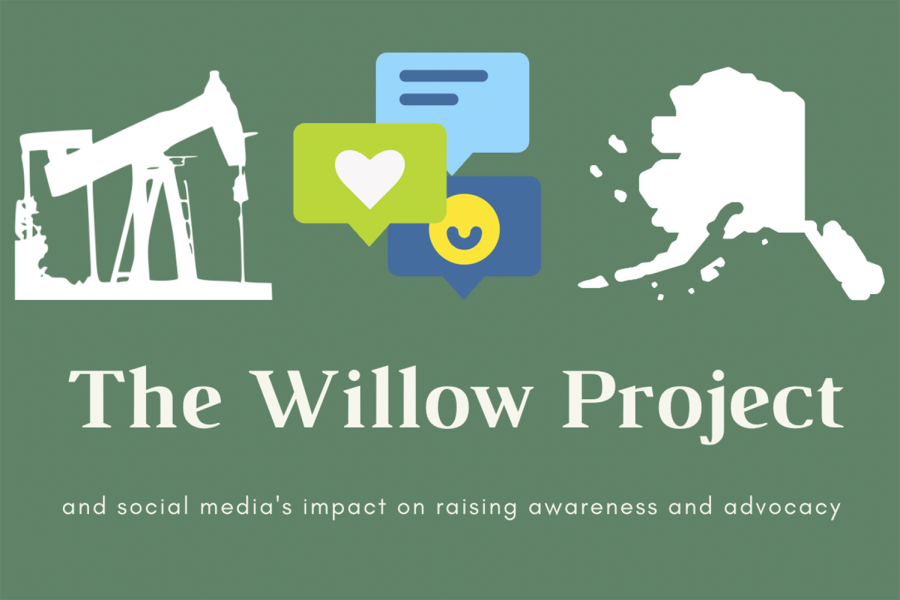Students react to Willow Project approval, role of social media in advocacy
Photo credit: Audrey Chang
The Willow Project is a massive oil drilling venture in the National Petroleum Reserve in Alaska, which is estimated to produce enough oil to release 9.2 million metric tons of carbon pollution per year. Prior to its approval March 13, awareness of this project and advocacy against it was especially spread through social media platforms. (Graphic Illustration by Audrey Chang)
March 22, 2023
The world is generating more renewable energy than ever before, and during the first six months of 2022, almost a quarter of electricity in the U.S. came from renewable sources. In contrast to this gradual shift away from fossil fuels, like oil and gas, that contribute to climate change, the Biden Administration approved a massive oil drilling project Monday, March 13, called the Willow Project.
ConocoPhillips‘ Willow Project in the National Petroleum Reserve in Alaska has sparked controversy as it is estimated to release 9.2 million metric tons of carbon pollution per year, which will further the climate crisis.
Alaska’s congressional delegation and some Alaska Native groups have supported the Willow Project because it would produce more revenue and jobs. Environmental groups and other Alaska Natives have opposed it due to environmental risks.
Leading up to the approval, there was a wave of online activism against the Willow Project, especially on TikTok, illuminating a wider trend of Generation Z’s use of social media to amplify their voices.
Junior Rebecca Lazarus said she first heard about the Willow Project through Instagram posts urging President Biden to not approve the project. Once seeing many posts, she fact-checked the information and learned more about the project’s potential implications.
“It plays into the bigger discussion and picture of overall climate agenda and advocacy and how we’re all interacting with the government and the policies that are then going to affect us,” Lazarus said. “I do talk about the climate a lot with my family, with my friends, and I have a lot of friends who are deeply involved in youth climate action, so it’s definitely a setback, and it was definitely something that brought up negative emotions.”
Archer Council for Sustainability co-leader Dani Fenster (’23) said she found out about the Willow Project from a mix of news headlines and social media posts from her friends, leading her to research the topic. She discussed the importance of reaching 0% greenhouse gas emissions and how this project counteracts that goal.
“I just think that at this point in where our country is and where our energy is coming from … there is no excuse for approving an oil drilling project at this point in just where we’re at with climate change and with global warming,” Fenster said. “We need to be working on renewable energy no matter what.”
Over 1 million letters were written to the White House protesting the project, and a Change.org petition has collected over four million signatures. Sophomore Rachel Chung said she initially learned about the Willow Project when her friends were discussing TikTok posts about it, which is also how she discovered the petition.
“Especially on TikTok, there’s entire wave of information is passing through right now … the petition has been shown on TikTok [and] multiple times on Instagram with people’s stories,” Chung said. “That’s really important because since most teenagers have social media, it’s a really good way to spread information.”
There are differing opinions about what impact activism and advocacy through social media can have and whether it is performative or genuinely showing support or helping raise awareness about a cause. Fenster said, specifically for climate-related issues, social media can be useful in making younger generations’ voices heard.
“Social media ‘advocacy,’ is definitely controversial, and I’m not completely sure how I feel about it for topics like race and racism that I think [are] completely different than this,” Fenster said. “With climate-related topics, one of the biggest things that young people can do is just make their voice heard and make the people in power know that they do care about it.”
Lazarus said, in her experience, seeing posts has helped her learn more about movements, in addition to having a variety of useful and factual information.
“Based on my experiences, since eighth grade, both inside of advocacy organizations and outside as just a member of society seeing posts — I think it is helpful,” Lazarus said. “I do appreciate getting to see the posts and learn about something new. Sometimes it gets repetitive when people are constantly posting just the same exact thing that everyone who follows everyone in the same one group is seeing.”
According to a Pew Research Center survey, “Gen Z and Millennial social media users are more likely than older generations online to engage with climate change content on social media and to express a range of emotions when they see climate-related content there.” Fenster, Lazarus and Chung agreed posts on social media can be a useful way to bring awareness to issues people may have not known about otherwise, like the Willow Project.
“I don’t think I’d call it performative activism for someone to post that on their story because it is raising awareness, and this isn’t necessarily something that every young person has the ability to actually physically do something about,” Fenster said. “It’s important just at this point … for young people to just amplify our dissatisfaction with decisions like this as much as possible, and social media is definitely a way to do that.”









